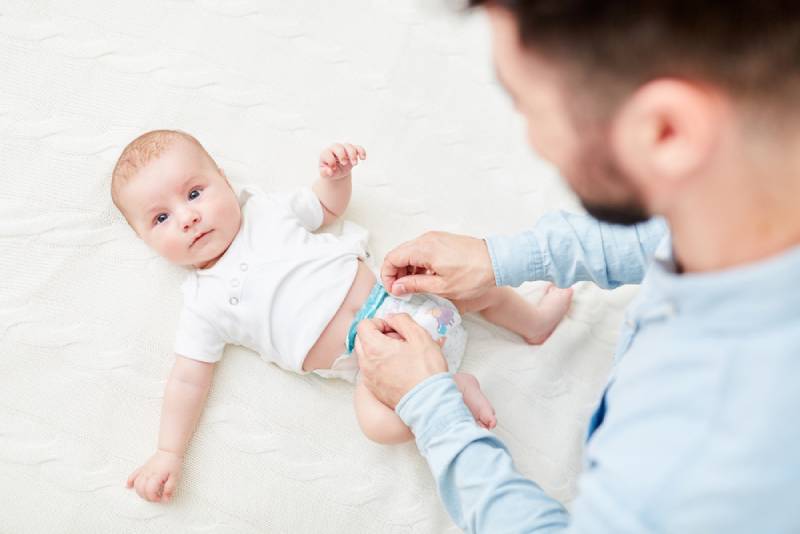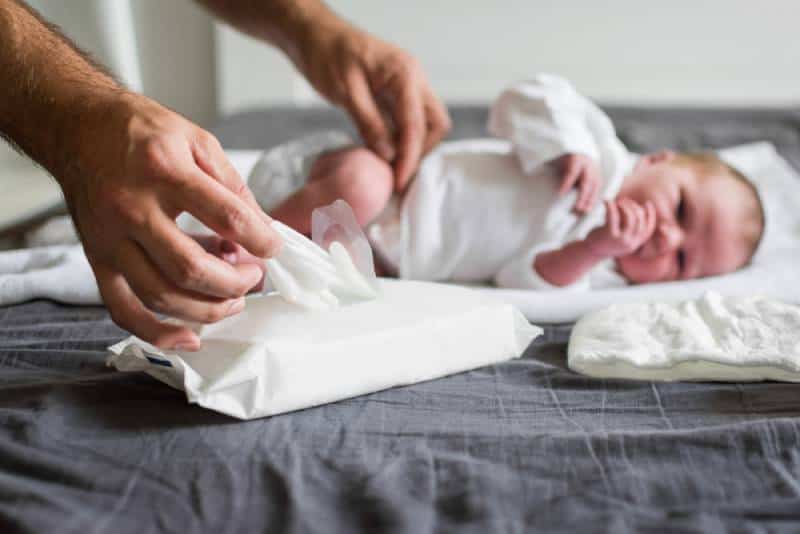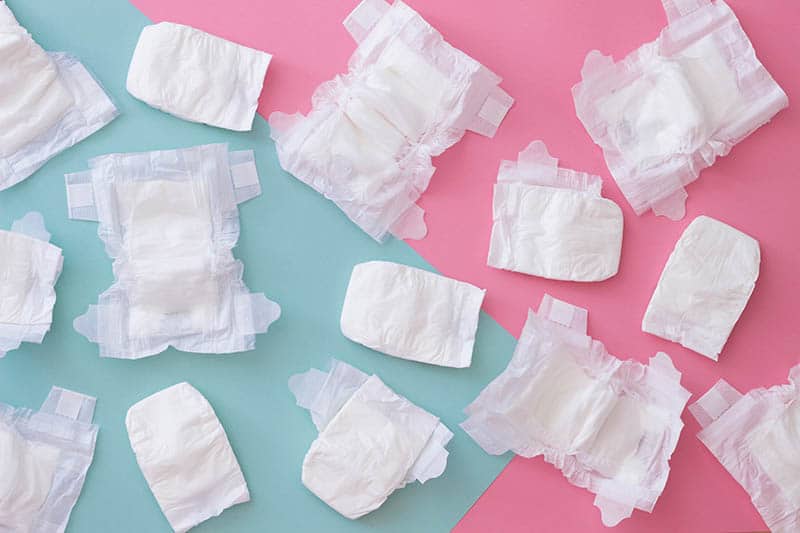Before you even welcome your little angel into this world, you’ll have many questions about everything you should expect after the birth.
Some of those questions will definitely be related to a newborn baby’s poop: How often do newborns poop? What’s normal and what’s not?
It’s better to do some research before you have to deal with all of that because getting answers beforehand will prepare you for what’s coming.
That’s how to make sure you don’t freak out the first time you see blood in your newborn’s poop or when your baby doesn’t poop at all for an entire day or more.
Most new parents get worried after even the smallest change they see in their baby’s stool.
But, the truth is that in most cases all those changes are pretty normal and there isn’t any reason to worry.
Still, you should be checking your newborn baby’s diapers because the frequency and color of your baby’s stool can reveal a lot about the health of your little one and whether or not they are receiving enough food.
You should also be aware of the fact that just as all babies are different, so are their stools and the number of bowel movements.
There are some babies who are indeed little poop machines.
All you do is change their poopy diapers all day long because it’s necessary after every meal and sometimes even more than that.
On the other hand, there are some babies who struggle with constipation and they can really go an entire week without pooping.
The fact is that the frequency of newborn poops during the first weeks of life will greatly depend on whether you’re formula-feeding or breastfeeding your little one.
If you’re worried about your baby’s bowel movements, you should take a photo of your baby’s stool and show it to your pediatrician. However, be aware that there will be changes to your baby’s stool within the very first few weeks of life.
How often do newborns poop? What should the color and consistency of their stool be? When should I take my baby to see a doctor? Keep reading below for more information.
How Often Do Newborns Poop?

Now, let’s get to the question you are actually all here for: How often should newborns poop and when should you see a doctor?
Well, let me first remind you that each baby is unique, and there is no need to panic immediately if your baby’s number of bowel movements doesn’t match any of these.
However, you should visit your doctor and consult with them regarding your baby’s stool whenever you feel the need for it.
How you feed your baby will greatly affect what you’ll find in their diapers and the nature of their stool.
Breastfed babies’ poop is very different from that of formula-fed babies.
How often should breastfed newborns poop?
Breast milk is a lot easier for babies to digest than a formula because it is a natural laxative. It has all the vitamins and nutrients necessary for your baby’s growth and development and it changes and adapts to your baby’s needs.
That’s why newborns who are breastfed have more regular bowel movements. They get everything they need through the breast milk and there is not much waste product left for babies to pass.
Another advantage of breastfeeding is that their poop isn’t smelly and they rarely have any digestive problems, such as constipation or explosive diarrhea, which can be very exhausting for newborns.
It’s typical for a breastfed baby to poop about 6-12 times a day.
The number of feedings and bowel movements is typically the same because they poop after almost every feeding.
That number may be reduced by 4 weeks of age. Your baby might only have 3-4 bowel movements a day, possibly less than that, or they may even go a whole day without pooping.
Baby’s intestines mature and develop and you’ll see that by 6 months of age, your baby will have a regular number of poopy and wet diapers.
A baby’s number of bowel movements will change, during the first month especially, but there is usually no reason to worry. Just pay attention to the color and consistency of your little one’s stool and be sure they nurse regularly.
The color of a breastfed baby’s stool is typically yellow-green and its texture is seedy and looser than the stool of formula-fed babies.
How often should formula-fed babies poop?
The first day after being born, your baby will have a very dark and tarry stool. This is common for all babies because it’s actually a product of everything they absorbed while still in the womb.
After that, if you start giving your baby formula because you can’t breastfeed, the color, frequency and texture of their stool will change.
Formula-fed babies have fewer bowel movements than babies who are nursing.
They approximately have around 3-4 stools a day but it’s also usual for formula-fed babies to go several days without any bowel movements.
However, the consistency and color of your newborn’s stool are more important than the number of bowel movements.
You should be monitoring the appearance of their stool and paying greater attention to how they look while pooping than to the number of stools.
The texture of a formula-fed baby’s stool is very similar to the texture of peanut butter. The color is green or yellow-brown and it’s thicker and firmer than the stool of a breastfed baby.
As already mentioned, some babies who are fed with formula can go a day without pooping, however, you should visit a doctor if your baby hasn’t had any bowel movements for more than 5 days.
When To See A Doctor?

How often do newborns poop? and when should I visit a doctor? are questions most new parents out there would like answered.
There are many reasons why you should keep track of your baby’s stool because indeed, it can be a good indicator of your little one’s health.
One of the most common health issues with newborns is constipation. If you notice your baby is struggling while pooping, or there are changes in their stools (loose texture or bloody lines), they’re probably constipated.
The American Academy Of Pediatrics agrees that, even though it’s very rare, a newborn baby’s constipation may be a symptom of a serious disease or sign of infection.
You can try some home remedies to help your baby with constipation, but first of all, you must consult with a pediatrician.
You can try to relieve the pain of constipation by exercising your little munchkin or giving your baby a warm bath to relax their muscles.
Apple, prune, or pear juice is also good when struggling with constipation. AGAIN, don’t do anything, especially give your baby juice or tea, without consulting your doctor first.
If your baby’s stool is too loose and they poop too many times a day, that can be a sign of diarrhea. Explosive diarrhea can be a sign of infection but it can also happen when your baby is teething. However, consulting your doctor about it is the best option.
If you have any concerns about the baby poop, how often newborns should poop, or the appearance of their stool, you should consult with a professional.
Color Changes In Your Baby’s Poop

I know how shocking it is to open up your baby’s dirty diaper and find something very strange and worrying there.
However, even though the color of your baby’s stool may be such a shock to you that you won’t believe me, most of those color varieties are actually normal.
• Black or dark green color
After the birth, your baby will have a greenish black, almost black stool. This is because of meconium.
Even though most babies pass the meconium in the first few hours after being born and several days after the birth, it’s not that rare for it to even stick around for several months.
Your newborn’s first poop doesn’t contain breast milk or formula. It’s actually a ‘product’ of all the things your baby ingested in the womb.
It’s sticky, thick, and disgusting for sure, but let’s be honest, no matter the color or consistency, all poops are.
However, there is a side you’re going to miss. It doesn’t stink. It actually doesn’t have any smell. Later, when your baby’s poop becomes smellier, you’ll be remembering your baby’s first poop and wishing all of their poops could smell like that.
Babies can also pass the meconium in utero. That might create some complications because the baby can inhale it and have trouble with breathing, this is called meconium aspiration syndrome.
• Green color
After several days, the color of your little one’s poop will become brighter. It will be green and probably not as thick as meconium.
However, even though it has become a little bit different, it still contains meconium, but now it also contains your breast milk or formula.
The American Academy of Pediatrics recommends giving iron supplements to all breastfed babies because breast milk doesn’t contain enough iron. If you do give an iron supplement to your baby, this green poop color can also be because of that.
If you have introduced solids to your baby, green foods such as beans or spinach can also cause the green poop color.
• Green-brown or yellow-brown
This is a typical poop color of formula-fed babies and the consistency is similar to peanut butter.
If you’re breastfeeding your baby but you aren’t producing enough breast milk, your pediatrician will probably recommend that you mix formula and breast milk.
However, it doesn’t mean that your breastfeeding is over. Consult with a lactation consultant and increase your milk production. But, while you’re giving your baby both formula and breast milk, their poop color will be shades of green or yellow with brown.
• Mustard yellow, yellow-orange, or yellow-green
These are typical poop colors of babies who are breastfed. The poop color will change as your baby grows.
Breastfed babies won’t poop as much as formula-fed babies and the smell of their poop is sweet, unlike the poop odor of formula-fed babies.
• Brown, yellow-brown
After you introduce solid foods to your baby, their stool color, smell and consistency will change once again because their digestive system adapts to the new food.
The yellowish brown shade of poop color is typical for babies who have begun eating solid foods. However, it can change because their poop color depends mostly on what food they eat.
How often should a baby poop after starting solids? It’s also a question no one can give you the right answer to because every child is different. It also depends on your baby’s diet. However, babies who are introduced to solid foods typically have one stool a day.
Conclusion

How often do newborns poop? How should a newborn’s stool look? How many wet diapers should a newborn have? How many poopy diapers should they have?
All these new worries can be very stressful for new parents. Every time you find something different and new in your baby’s diaper, you’ll freak out for sure.
However, most of the time, you’ll have no reason to worry. There will be many changes with their bowel movements as your baby grows and you should just keep monitoring it and be sure that they ingest enough food.
If you’re unable to go to your health care provider or you’re unsure about whether you should visit a doctor but you need advice regarding your baby’s health, you can call your provincial health line whenever you feel the need to.
Remember, even though parenting is stressful and there is so much to think about, you got this!
References:
- LeLeiko, N. S., Mayer-Brown, S., Cerezo, C., & Plante, W. (2020). “Constipation”. American Academy of Pediatrics in Review.
- Baker, R. D., Greer, F. R. & The Committee on Nutrition (2010). “Diagnosis and Prevention of Iron Deficiency and Iron-Deficiency Anemia in Infants and Young Children (0-3 Years of Age)”. American Academy of Pediatrics.
Like this post? Please share or pin it for later. You can also stay in the loop and follow us on Facebook, Instagram or Pinterest.

This post contains affiliate links. Please see our full disclosure for more info.

